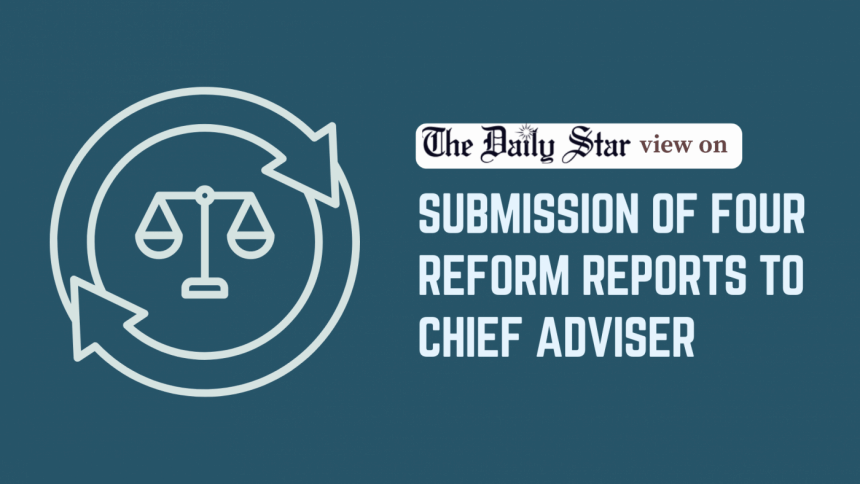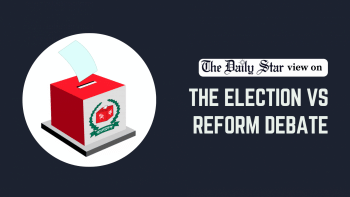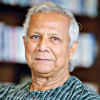A new chapter for the nation

We welcome the submission of reports by four reform commissions to Chief Adviser Prof Muhammad Yunus on Wednesday, bringing momentum into the interim government's state reform drive as it can now engage with key stakeholders based on the framework provided through these (and other upcoming) reports. As Prof Yunus has aptly called it, this marks the beginning of "a new chapter" for Bangladesh. In the coming days, the proposals submitted by the commissions on constitution, elections, police, and Anti-Corruption Commission (ACC) are expected to be discussed and debated at length to ensure consensus, with the talks with political parties likely beginning in mid-February. One hopes all this will eventually lead to the outcome desired by citizens.
Among the most crucial proposals are those aimed at restructuring the constitution and the electoral system. Expanding people's fundamental rights to include food, clothing, shelter, education, internet, and voting, the Constitution Reform Commission has proposed replacing "nationalism," "socialism," and "secularism" with equality, human dignity, social justice, and pluralism as state principles, with democracy the only core principle retained from the 1972 constitution.
The first signs, however, are encouraging, as the four reports propose sweeping changes targeting the systemic flaws that facilitated unchecked executive power, electoral manipulation, and institutional decay. Among the most crucial proposals are those aimed at restructuring the constitution and the electoral system. Expanding people's fundamental rights to include food, clothing, shelter, education, internet, and voting, the Constitution Reform Commission has proposed replacing "nationalism," "socialism," and "secularism" with equality, human dignity, social justice, and pluralism as state principles, with democracy the only core principle retained from the 1972 constitution. Key proposals also include a bicameral parliament, two-term limits for president and prime minister, allowing MPs to vote against party line (except in finance bills), decentralising the judiciary, forming a National Constitutional Council, stronger opposition-led parliamentary oversight, etc.
Meanwhile, the Electoral Reform Commission has recommended significant changes to enhance the Election Commission's powers and ensure its accountability. Key proposals include empowering the EC to suspend elections for up to 90 days with Supreme Court approval, disqualifying individuals accused of serious human rights violations from elections, holding all elections under a caretaker government, requiring political parties to conduct internal elections, banning their student, teacher or labour wings, online voting by expatriates, etc. The reform commission also called for the reintroduction of the "No-Vote" option. Similarly, reports by the Police Reform Commission and the ACC Reform Commission have laid down pathways to address systemic flaws in these vital institutions and ensure accountability.
At the heart of this drive lies a singular goal: to restore democracy in its true form and prevent the return of authoritarianism. The success of these recommendations, therefore, must be measured not by their adoption alone, but by their faithful implementation.
At the heart of this drive lies a singular goal: to restore democracy in its true form and prevent the return of authoritarianism. The success of these recommendations, therefore, must be measured not by their adoption alone, but by their faithful implementation. If we are to build a future where state power is exercised in service of the people rather than against them, any reforms must be pursued with an unwavering commitment to public interests. This is where the role of political parties—who will be tasked with implementing the reforms after the next elections—becomes crucial. They must credibly demonstrate their commitment to this process, including by undertaking intra-party internal reforms, while citizens too must actively take part in it.
Without the collaborative efforts of all, the change sought through the July uprising will remain unfulfilled.

 For all latest news, follow The Daily Star's Google News channel.
For all latest news, follow The Daily Star's Google News channel. 









Comments